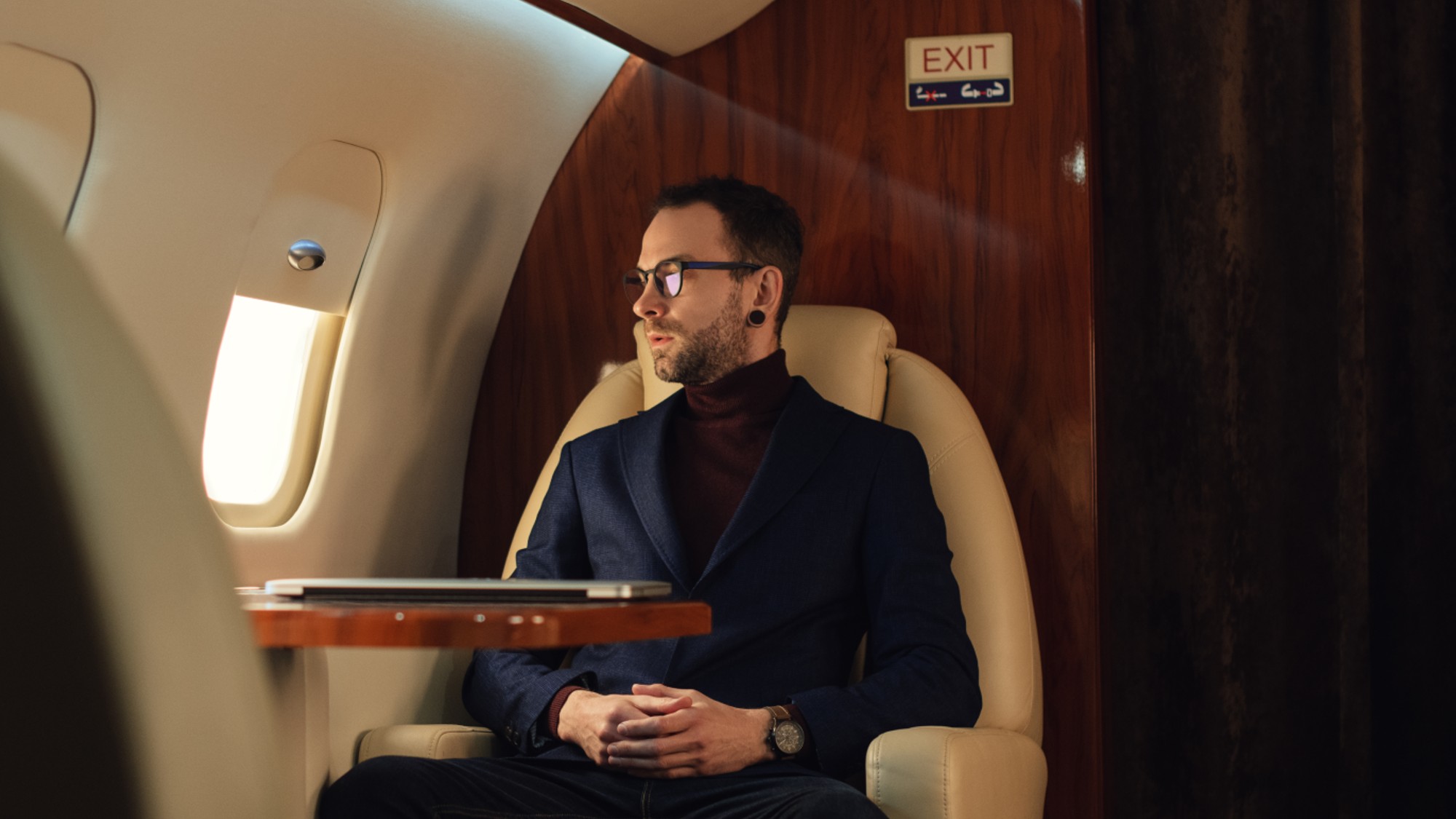Rawdogging flights: as bad an idea as it sounds?
Viral trend of travelling without entertainment, food or movement could offer mental respite and challenge, but risks boredom, dehydration and deep-vein thrombosis

A free daily email with the biggest news stories of the day – and the best features from TheWeek.com
You are now subscribed
Your newsletter sign-up was successful
With so much in-flight entertainment available on planes, you might wonder why on earth someone would "challenge themselves to sit in silence", said The Sun.
But a new trend known as "rawdogging" a flight – no phones, no films, no reading or distraction of any kind – is "taking the world of social media by storm", said the paper. The term went viral in May after a 26-year-old Londoner posted on TikTok about spending a seven-hour trip watching only the flight map. "Anyone else bareback flights?" he asked.
The trend "crossed over into mainstream conversations" after Manchester City footballer Erling Haaland posted a picture of himself on a plane, said The Daily Mail. He claimed to have made it through a seven-hour flight with "no phone no sleep no water no food only map". It was "#easy", added the young Norwegian – though he looked "pale and almost robotic", said the paper.
The Week
Escape your echo chamber. Get the facts behind the news, plus analysis from multiple perspectives.

Sign up for The Week's Free Newsletters
From our morning news briefing to a weekly Good News Newsletter, get the best of The Week delivered directly to your inbox.
From our morning news briefing to a weekly Good News Newsletter, get the best of The Week delivered directly to your inbox.
'The opportunity to recharge mentally'
Once slang for sex without a condom, the term "rawdogging" is used online to mean doing something without protection or support – the hard way, said the BBC. Increasing numbers of "mostly athletic young men" are posting videos of themselves "rawdogging" flights, perhaps to showcase their ability to "handle solitude and discomfort with stoicism".
The trend implies "a collective yearning for balance as people seek to reclaim their mental space and foster a deeper connection with their inner selves", said business psychologist Danielle Haig. In our fast-paced world, rawdogging "offers an opportunity to recharge mentally".
The "visceral, shocked reaction" to the trend is understandable, said Sadhbh O'Sullivan for the i news site. But modern life contains a "constant barrage" of stimulation. Once I stopped wearing headphones, I found myself thinking peacefully. I felt engaged with the world and looked at my phone less. Now I am content to sit with my "whirring" brain, and chase particular trains of thought once "drowned out by a comedy podcast".
Being alone with my thoughts has become a "treat, not a punishment". Forget flights – I'm "rawdogging life". "And frankly, I am loving it."
A free daily email with the biggest news stories of the day – and the best features from TheWeek.com
'I've never been so bored'
But this is nothing new, after all. "Young, internet-dwelling men" seem to think they "invented self-restraint", said Guy Kelly in The Daily Telegraph. But these "tough nuts" remind me of "stylites", said Christopher Howse in the same paper – 5th-century religious "ascetics" who sat on pillars during the early Byzantine Empire days. "Silent, fasting and weatherbeaten, but a bit show-offy."
Experts have warned that taken to extremes – i.e. no standing, eating or drinking during a longhaul flight – can lead to dehydration, fatigue and even deep vein thrombosis. "They're idiots," GP Gill Jenkins told the BBC. "A digital detox might do you some good, but all the rest of it is against medical advice."
This trend has simply become "the latest way for men to prove their masculinity", said The Guardian's Rich Pelley. Or perhaps the gender divide might be because "women simply wouldn't be that stupid". Without headphones, all thoughts revert to: "Are we nearly there yet?" – like a five-year-old.
After rawdogging a six-hour Megabus journey, one thing's for sure: "I've never been so utterly bored in my entire life".
Harriet Marsden is a senior staff writer and podcast panellist for The Week, covering world news and writing the weekly Global Digest newsletter. Before joining the site in 2023, she was a freelance journalist for seven years, working for The Guardian, The Times and The Independent among others, and regularly appearing on radio shows. In 2021, she was awarded the “journalist-at-large” fellowship by the Local Trust charity, and spent a year travelling independently to some of England’s most deprived areas to write about community activism. She has a master’s in international journalism from City University, and has also worked in Bolivia, Colombia and Spain.
-
 Antonia Romeo and Whitehall’s women problem
Antonia Romeo and Whitehall’s women problemThe Explainer Before her appointment as cabinet secretary, commentators said hostile briefings and vetting concerns were evidence of ‘sexist, misogynistic culture’ in No. 10
-
 Local elections 2026: where are they and who is expected to win?
Local elections 2026: where are they and who is expected to win?The Explainer Labour is braced for heavy losses and U-turn on postponing some council elections hasn’t helped the party’s prospects
-
 6 of the world’s most accessible destinations
6 of the world’s most accessible destinationsThe Week Recommends Experience all of Berlin, Singapore and Sydney
-
 The 8 best superhero movies of all time
The 8 best superhero movies of all timethe week recommends A genre that now dominates studio filmmaking once struggled to get anyone to take it seriously
-
 Josh D’Amaro: the theme park guru taking over Disney
Josh D’Amaro: the theme park guru taking over DisneyIn the Spotlight D’Amaro has worked for the Mouse House for 27 years
-
 The best fan fiction that went mainstream
The best fan fiction that went mainstreamThe Week Recommends Fan fiction websites are a treasure trove of future darlings of publishing
-
 Is a social media ban for teens the answer?
Is a social media ban for teens the answer?Talking Point Australia is leading the charge in banning social media for people under 16 — but there is lingering doubt as to the efficacy of such laws
-
 How Utah became a media focal point
How Utah became a media focal pointIn Depth In producing the stars of #MomTok and reality TV alike, Utah has emerged as a media powerhouse
-
 Golden Globes affirm ‘One Battle,’ boost ‘Hamnet’
Golden Globes affirm ‘One Battle,’ boost ‘Hamnet’Speed Read Comedian Nikki Glaser hosted the ceremony
-
 ‘One Battle After Another’ wins Critics Choice honors
‘One Battle After Another’ wins Critics Choice honorsSpeed Read Paul Thomas Anderson’s latest film, which stars Leonardo DiCaprio, won best picture at the 31st Critics Choice Awards
-
 The best alcohol-free alternatives for Dry January
The best alcohol-free alternatives for Dry JanuaryThe Week Recommends Whether emerging from a boozy Christmas, or seeking a change in 2026, here are some of the best non-alcoholic beers, wines and spirits to enjoy